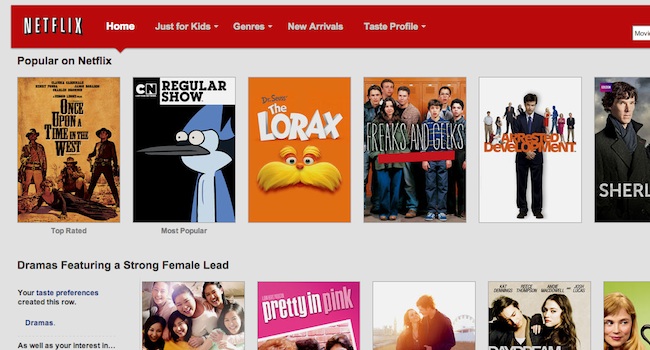Tomorrow, on May 1st, a huge selection of titles will be expiring from Netflix in the United States. The majority of films expiring are from MGM. Many are schlocky B-movies, as well as a number of true classics like Kes, A Canterbury Tale, The Man Who Fell to Earth and One, Two, Three. Titles frequently expire from Netflix, and new films are added all the time, but this time it’s different. The sheer number of titles expiring is enough to give pause to anyone who’d been looking to streaming services as the future of home video.
It’s not just this instance, though, that signals a problem. Netflix now has stated intentions not to focus on a building a library of catalog titles; instead putting attention toward exclusivity deals and original programming like House of Cards and Hemlock Grove.
In the most recent Netflix Earnings Call, Netflix CEO Reed Hastings stated, “I think we are focused on moving towards more and more exclusive content, which reinforces a reason to join Netflix.” The motive behind this is quite simple for a company like Netflix. The nature of licensing deals is such that they can never claim to have “everything,” so instead the focus is on exclusive deals for content that customers actually want.
The problem here is that exclusivity deals mean content becomes split more and more between several services. The dream of cutting the cable cord and throwing away all your DVDs is fading. To do that, you’d need to subscribe to at least three different streaming services, plus supplement with higher priced single items on VOD and the iTunes Store. Then there are the subscriptions to HBO and Showtime, which still require a cable subscription. And the cable subscription itself is still attractive for all the live airings of shows, which is a blessing in the Internet age, where episodes are often spoiled as they air. In the end, keeping all these services becomes a very expensive proposition.
That’s just for people who want the complete package, though. Most people, I’m sure, are glad to simply have a cable subscription and supplement it with either Netflix or Hulu+. The real problem arises with the notion that anything you want will always be (legally) available. It’s a fallacy—as this month’s enormous list of expiring titles demonstrates.
I’m a big collector of Blu-rays. It’s probably not totally justified, but my general principal has always been, if it’s a film I love I value owning it, and at the best quality possible. Even Netflix HD cannot compare to the quality of a well-pressed Blu-ray. I’m often asked why I buy movies when I could easily watch them on Netflix. Well, the answer in a lot of specific cases is that not every film shows up on Netflix. But what about the films that do? Well, as we can see from that big list of movies disappearing on May 1st, even if a film is on Netflix, that doesn’t mean it’ll be there forever. A Blu-ray is relatively permanent. I’m not at the whim of exclusivity deals, or even streaming hiccups. If I’ve got the disc and a player, it just works.
Furthermore, as exclusivity becomes king, obscure catalog titles become less and less important, allowing such titles to fall through the cracks. To stem this tide, Warner Bros. has launched its own subscription-based streaming service for their Archive collection. It’s a wonderful idea, but it’s not comprehensive. Where will that treasure trove of MGM catalog titles go now that they’re disappearing from Netflix? Hopefully we see them again soon, but it’s hard to know for sure.
Streaming services are becoming a more and more important part of the movie and TV-watching experience, but they aren’t necessarily the all-purpose solution people have been looking for in the new age of the cloud. The more that time goes by, the more that services like Netflix look very similar to on-demand versions of premium cable services like HBO. That’s not a bad thing, but it’s important to realize that that’s what they are, and that plenty of great content will still be very difficult to find legally and affordably.




















2 thoughts on “The Great Netflix Purge & the Future of Streaming Media”
It’s funny you’re writing this being a Canadian, Corey, where I imagine most of these titles aren’t even available in Netflix Instant in Canada. Of course, that speaks to another major problem with these services: the internet is global, but these services are restricted by what region you live in. I get the whole licensing side of it, the movie industry has long entrenched system of distribution for specific countries, but that’s making less and less sense with the rapid rise of a global economy.
Right now, I’m still happy with Netflix. I’m augmenting it with a lot of library viewings and the sporadic TCM DVR of a film Netflix doesn’t have. On the whole, there’s enough on instant and DVD that as long as I’m not super picky or have my heart set on a particular film.
Well, I do watch plenty of stuff from the American Netflix via special services. It’s not quite legal, but it’s not really pirating either. Either way, you bring up an excellent point. The regional licenses make it so difficult for companies like Netflix to make deals. It’s hard enough for them to make deals for stuff in the US, let alone for each other country.
Right now I’m signed up for Netflix and Warner Archive Instant. REALLY loving the latter, though I’m hoping they make it easier to watch stuff on a TV soon.